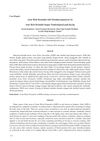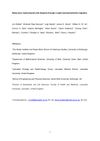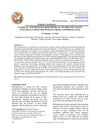 January 2024 in “Deleted Journal”
January 2024 in “Deleted Journal” Essential oils may help hair health but lack strong scientific proof and can cause allergic reactions.
 January 2024 in “Archives of dermatological research”
January 2024 in “Archives of dermatological research” Both treatments for alopecia areata showed similar modest effectiveness.
 January 2024 in “Burns and trauma”
January 2024 in “Burns and trauma” The skin microbiome helps heal wounds and can be targeted to improve healing.

Henna has many medicinal uses but needs more research to confirm its benefits.
 November 2023 in “Frontiers in pharmacology”
November 2023 in “Frontiers in pharmacology” Drug repositioning offers hope for new, affordable treatments for a genetic skin disorder called ARCI.
 October 2023 in “Dermatology practical & conceptual”
October 2023 in “Dermatology practical & conceptual” Pulse corticosteroids help regrow hair in alopecia areata but have side effects, especially betamethasone.
 October 2023 in “Benha Journal of Applied Sciences”
October 2023 in “Benha Journal of Applied Sciences” Methotrexate and vitamin D3 are potentially more effective and safer than triamcinolone for treating localized alopecia areata.
 September 2023 in “Asian journal of beauty & cosmetology”
September 2023 in “Asian journal of beauty & cosmetology” Lipids are important for healthy hair, but their exact role is not fully understood and needs more research.
 September 2023 in “Dermatology and therapy”
September 2023 in “Dermatology and therapy” Ritlecitinib effectively improves hair growth in alopecia areata patients, regardless of hair loss pattern.
 August 2023 in “International journal of research in medical sciences”
August 2023 in “International journal of research in medical sciences” The serum is safe and helps treat premature greying of hair.
 August 2023 in “International journal of research in dermatology”
August 2023 in “International journal of research in dermatology” Janus kinase inhibitors are effective and generally safe for treating hair loss in adults with alopecia areata.
 August 2023 in “Clinical and experimental dermatology and therapies”
August 2023 in “Clinical and experimental dermatology and therapies” Dupilumab may help hair regrowth in some patients with severe atopic dermatitis, but results vary.
 June 2023 in “Dermatology and therapy”
June 2023 in “Dermatology and therapy” The Middle East and Africa need better data, treatment consensus, and support for Alopecia Areata.
 April 2023 in “Jurnal Sain Veteriner”
April 2023 in “Jurnal Sain Veteriner” A young Persian cat had a skin infection and low platelets, treated with various medications.

The study aims to create a model to improve personalized and preventive health care.
 March 2023 in “Clinical, cosmetic and investigational dermatology”
March 2023 in “Clinical, cosmetic and investigational dermatology” IL-33 is linked to hair follicle damage in psoriasis and could be a treatment target for hair loss in this condition.
 January 2023 in “bioRxiv (Cold Spring Harbor Laboratory)”
January 2023 in “bioRxiv (Cold Spring Harbor Laboratory)” Newly born mesenchymal cells quickly spread out in response to tissue tension during early development.
 January 2023 in “Trakia Journal of Sciences”
January 2023 in “Trakia Journal of Sciences” Goats infested with lice showed anemia and skin issues, which improved after treatment.
 November 2022 in “CARDIOMETRY”
November 2022 in “CARDIOMETRY” A group has developed therapies that show promise for treating cancer and various other conditions.
 November 2022 in “Nihon Nyuusankin Gakkaishi/Nihon Nyūsankin Gakkaishi”
November 2022 in “Nihon Nyuusankin Gakkaishi/Nihon Nyūsankin Gakkaishi” The lotion with N793 strain significantly increased hair density and reduced hair loss safely.
 October 2022 in “Research Square (Research Square)”
October 2022 in “Research Square (Research Square)” The conclusion is that certain chemicals from Bacillus subtilis help improve plant root growth through a hormone-related process.
 June 2022 in “bioRxiv (Cold Spring Harbor Laboratory)”
June 2022 in “bioRxiv (Cold Spring Harbor Laboratory)” ILC1-like cells can cause alopecia areata by attacking hair follicles.

No single biomarker is reliable enough for diagnosing and assessing SLE.

Human hair keratins can be turned into useful 3D biomedical scaffolds through a freeze-thaw process.
 November 2021 in “Journal of pharmaceutical research international”
November 2021 in “Journal of pharmaceutical research international” Herbal depilatories are safer and cause fewer side effects than chemical ones for hair removal.
 October 2021 in “Dermatology Reports”
October 2021 in “Dermatology Reports” Higher IL-17A levels indicate more severe alopecia areata.

Tacrolimus causes fewer acute rejections than cyclosporin A in kidney transplants but doesn't necessarily improve kidney function after one year; cardiovascular risks and side effects vary between the two drugs.

Wild African goats have genetic adaptations for surviving harsh desert conditions.
 March 2021 in “Actas Dermo-Sifiliográficas”
March 2021 in “Actas Dermo-Sifiliográficas” The microbiome may be linked to hair loss and could be a target for new treatments.
 February 2021 in “Journal of pharmaceutical and biological sciences”
February 2021 in “Journal of pharmaceutical and biological sciences” No cure exists for alopecia areata, and treatments are personalized.






























